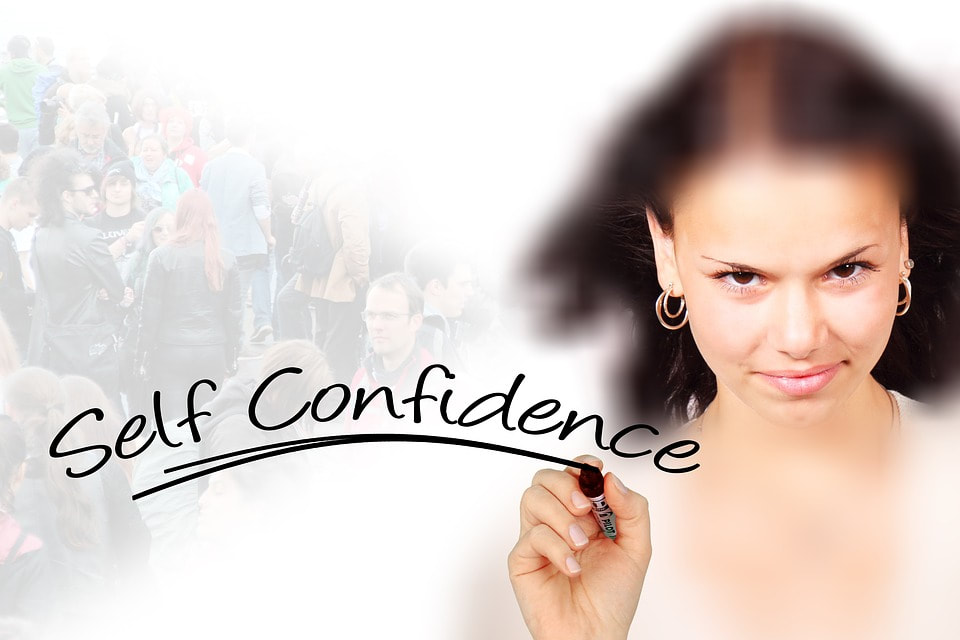|
"Low self-confidence isn't a life sentence. Self-confidence can be learned, practiced, and mastered--just like any other skill. Once you master it, everything in your life will change for the better." ~ Barrie Davenport We do our best work when we are confident. Procrastination, subpar work and an unwillingness to put our work out there all happen when our confidence is low. But like the quote above says, we can build our confidence. Some of the ideas below come from The As If Principle by Richard Wiseman. In it he mentions a number of studies about our physical responses and behaviors. He says we interpret our body’s reactions by the context in which we find ourselves. We can also choose to feel a certain way just by the way we position our body. Below are some techniques you can use to express and feel the confidence you need to get the writing done and out into the world. Reframe what’s happening in your body Our bodies have very few responses, so the excitement of love and the fear of sending a query letter to an agent have the same physical response. We are conditioned to choose an emotion that fits the context based on past knowledge. With awareness we can choose any emotion we want once the body begins responding. So let’s take the example of sending a query letter. You’re at your keyboard and about to hit send on an email to an agent you really like. Your hands are sweaty and your heart is racing. Take a few deep breaths and tell yourself that you’re excited about the opportunity. You know your manuscript is polished and your ideas sound. If you can keep your focus on that for a minute you will begin to feel the excitement. From this place it’s so much easier to hit send. Take on a confident pose Our bodies do affect our emotions. One study showed that people felt less pain from an electrical shock if they “acted tough” like nothing was going to hurt them and they put their bodies in a relaxed position. Let’s say you’re getting ready to make a pitch to an agent at a writer’s conference. Stand tall, chest out, but don’t make your body rigid. Keep it relaxed. In a less formal situation, like a party, you can lean back in a chair with your arms draped over the back or behind your head. Feel the confidence set in. Do it now. How do you feel? Play with it. Slouch for a bit and then stand tall. See how different you feel from one to the other. Looking confident will also make others take notice of you. And standing tall allows you to breathe better so you can project a stronger voice. Plan and rehearse Before you pitch, take some time to plan what you’re going to say and rehearse it. Do it out loud. Get members of your family to listen to you or enlist a few friends. Every time you do it you’ll feel more self-assured. Planning and rehearsing also work before you write. There is great value you in outlining or at least being clear on what subject or scene you’re going to write next. It even helps to rehearse by visualizing your writing session going well. Do something that you are a good at and love to do There are times when we fall into comparison thinking and pull our confidence way down. Or sometimes someone says something that puts us into a spiral of self-doubt. (Don’t read those negative reviews.) One of the best things to do when this happens is to take action and do something that you’re great at and love to do. There’s nothing like being in your zone of genius to boost your confidence. Read positive statements about yourself out loud One study had two groups of volunteers read statements out loud. The first group read statements like, “Saturn has rings.” The second group read positive statements about themselves. The second group came out of the experiment feeling great! The statements below are a little different from the example in the book. I’ve geared these towards inspiring confidence. I encourage you to create your own once you’ve got the hang of it and to use them to read out loud when you need a confidence boost. Statements that can help you increase your confidence 1. I am a great ______________. 2. I can do _______________ well. 3. People love what I do. 4. I have confidence in my ability to ___________. 5. I help people ____________. 6. I am loved and appreciated. 7. I feel enthusiastic about life right now. 8. I get along with most people I meet. 9. I am optimistic about my future. 10. My work is going well. 11. I am successful at _______________. 12. I feel happy and secure in this moment. 13. People love to be around me. 14. I am full of energy and doing what I love. 15. Today is going to be a fun and successful day. Confidence is everything. One of the best baseball players in the MLB today said that in an interview recently. He said it takes work to keep up your confidence. A pro works at it. This is just as important as practicing the craft. May your path become clearer as you build your confidence. If you’d like continued support on your writing journey, sign up to receive this blog and other helpful ideas and tools directly to your inbox.
0 Comments
Day after day you stare at a blank page or avoid going near your work in progress all together. Scrubbing toilets is beginning to look like a better use of your time. And you just can’t figure out what’s wrong.
Whether it’s been a few days or endless weeks and months since you last worked on your current project, know it’s possible to get back to it. If you’re reading this, you’re interested in figuring it out. And that shows you still have some motivation. It’s time to get your journal and write. As a writer, I find one of the best ways to figure something out is to write about it. The Questions Do I know what I need to write next? If not, what can I do to figure it out? The first question has to do with the project itself. Often writer’s block happens because we don’t know what to write next. This is often a planning problem. If you didn’t outline before you started, then you don’t have a roadmap to keep you from getting stymied about 1/3 of the way in. Go back over what you’ve done and create an outline. It can help you see the gaps. Then you figure out how to fill them. Once you know your next step, sit down and write. If you have an outline and are still blocked, revisit it. It also helps if you have a writing buddy you can run it by. Often someone else can more easily see what the problem is. To make sure you don’t have this problem again, you might want to take up outlining as a regular practice. Whether you do this or not, it’s helpful to write down exactly what you’re going to work on before your next writing session. If all seems well as far as next steps go, it’s time to get personal about your relationship to your WIP. How do I feel about my current work in progress? Is my motivation low because I don’t care much for the story or subject? Scary question if you’ve spent months or even years on your current project. It could be you’ve lost interest if it’s been in your life a long time. This doesn’t mean it’s not a worthy idea or story to pursue. Sometimes we just need a break. You can also regain motivation by tapping into how you felt about it originally…especially if you were really excited about it. Use your imagination and write about how you felt when the idea first dawned on you. Feel the excitement. What thoughts help you feel that way? Use words that will help you sustain the feeling. Our feelings, our emotions move us into action. If one of the two questions above doesn’t help you solve the problem, try this third question. What happened in my life about the time I stopped working on my current project? Have you gone through a major life change in the past six months, year? Things going on in our lives can have a greater effect on our work than we realize. It may seem like enough time has passed for you to feel better. But it depends on how big a change it was and your own emotional health as to how long it will take to heal. It has taken me over a year after an unexpected move and my mother dying a little over a month afterwards to fully engage in life again. Be aware of where you’re at emotionally. Sometimes it takes a while to recover from a major life event. And that means we may not be up to working at the same pace we once were or even working at all. Take some time write about how you’re feeling if this seems to be your issue. Use your journal to process through your feelings. It can help you get back on track. If you’re still not sure why you’re not getting the writing done, contact me. I’m here to help. You may have chronic procrastination. That's what I have. It takes working with your mind every day to overcome it. It will get better even if it doesn't go away. You learn to work in ways that help you get the writing done. If you’d like to receive helpful posts like this one every week directly to your inbox, sign up here. You’ll also get other free resources to help you on your writing journey. I learned this, at least, by my experiment; that if one advances confidently in the direction of his dreams, and endeavors to live the life which he has imagined, he will meet with a success unexpected in common hours. ~ Henry David Thoreau Maybe you don’t feel confident in your ability as a writer. Maybe you think you don’t know enough or have what it takes. How do you confidently move in the direction of your dreams then? The answer is simple, but it’s not always easy. The secret to building confidence is to take action. Maybe you don’t feel confident at first, but I promise once you’ve done it, you will begin to feel confident. A lack of confidence often stems from not knowing. Seek to know by taking action. Dreaming is great. We must dream before we do, but to remain in the dream phase means that we’ll never make our dreams come true. We have an idea, but to bring it into the world, we must begin to take action. This action will help us build confidence and that confidence will fuel further action. If the key is confidence, and action is what brings confidence, what fuels action? Feelings. We often say we don’t feel motivated. Feelings move us to act. But we need to go another step back. Feelings are fueled by our thoughts and beliefs. If you don’t think you’re good enough, you’ll feel defeated and won’t take the action you need to take to build your confidence. The exercise below will help you advance in the direction of your dream of being a writer and author. Choose an action What is one small action you can take today that will get you one step closer to your dream? Make this something simple and measurable to be completed within a certain time frame. For example, you could research what you need for an article idea or make an outline for the book you’d like to write. Now create a deadline in which to complete this action. Create motivation for your action What feelings will motivate you to take the action you came up with above? What kinds of thoughts make you feel that way? Think your thoughts. Do you believe them? You have to believe them to provoke the feeling you want. Now feel the feelings. Do you feel like taking the action you chose? Take the action Just do it as a certain active wear empire says. Even if you can’t find the motivation, take the action. If it’s small and doable, you should be able to get it done no matter what resistance you feel. Check in with yourself How did you feel while taking the action? Was there any resistance? How do you feel after taking the action? Were you able to take the action or did you let it slide? If you feel resistance, it could be the action you chose is too big. Break it down into smaller steps and set up deadlines for each step. And if you’re still having trouble, ask for help. I help writers write. I help you get it done. I even help you get started if that’s what you need. You’ve dreamed of this. Don’t let anything stop you from living the life you imagined. Take action in the direction of your dreams. Click the link to The Writers Sangha. Join the group. Ask questions. Get the writing done. The Writers Sangha is a Facebook group where you’ll get the guidance and accountability you need to live your dream. |
Archives
December 2019
Categories |




 RSS Feed
RSS Feed
